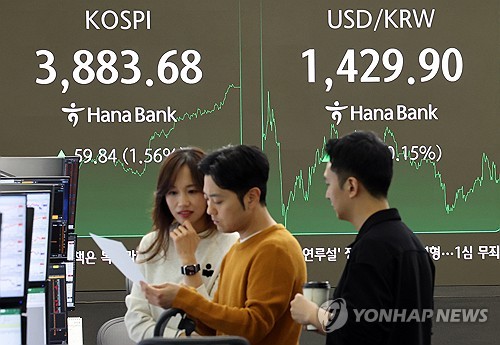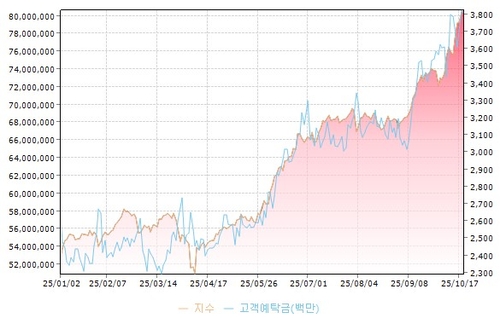(Seoul=Yonhap Infomax) South Korea’s equity markets have surged sharply this year, even as the real economy remains subdued. The capital markets are running hot, with investor sentiment increasingly driven by fear of missing out on the rally rather than concerns over potential losses.

The benchmark KOSPI index closed at 3,838.68 on the previous trading day, up from 2,399 at the end of last year—a nearly 62% increase. This performance ranks among the highest globally. Shares of Samsung Electronics Co., South Korea’s largest company by market value, soared 85% from 53,200 won to 98,600 won ($39.50 to $73.00), while SK Hynix Inc. skyrocketed 177% over the same period. The KOSDAQ index has also climbed approximately 30% year-to-date.
This stock market rally has far outpaced gains in the housing market. According to Korea Real Estate Board data, Seoul apartment prices rose just 6.11% cumulatively through the second week of October (as of October 13). Even in overheated districts such as Songpa-gu (15.22%), Gwacheon (14.11%), Seongdong-gu (13.86%), Bundang-gu (11.57%), and Mapo-gu (10.79%), price increases have lagged well behind equities.
As a result, investor perceptions of real estate versus equities are shifting. In a July survey by Gallup Korea, one in three respondents cited stocks as the most favorable investment vehicle going forward, with 31% choosing equities and only 23% selecting real estate. This marks the first time in 25 years of Gallup polling that real estate has ceded the top spot to stocks as the preferred wealth-building strategy.
This shift reflects the impact of tighter real estate regulations under the Lee Jae-myung administration, including stricter lending limits. It also coincides with government policy targeting a “KOSPI 5,000 era,” fueling expectations that the longstanding “Korea discount”—the undervaluation of Korean equities—may finally ease.
As capital flows from property into equities accelerate, the Korea Exchange has seen daily average stock trading value rise, and investor deposits—funds held at brokerages for trading—have repeatedly hit record highs, surpassing 80 trillion won ($59.2 billion) as of October 22, up from 57 trillion won ($42.2 billion) at the start of the year.

However, if the real estate market fails to stabilize, this trend may prove temporary. Policymakers must treat housing as a means of residential stability, not speculation, and rigorously assess the effectiveness and public acceptance of various regulations.
Given that the real economy underpins sustainable growth, the government should intensify efforts to boost real sector activity, rather than simply celebrating rising stock prices. Improving corporate fundamentals is essential.
Ensuring a healthy investment environment in the capital markets is also a key challenge. The recent rally has fueled a surge in leveraged investing, with margin loans—borrowed funds used to buy stocks—already exceeding 24 trillion won ($17.8 billion). While the government remains wary of the myth of “invincible real estate,” indiscriminate stock market speculation based on expectations of perpetual gains must also be approached with caution. (Editor-in-Chief)
eco@yna.co.kr
(End)
Copyright © Yonhap Infomax Unauthorized reproduction and redistribution prohibited.

